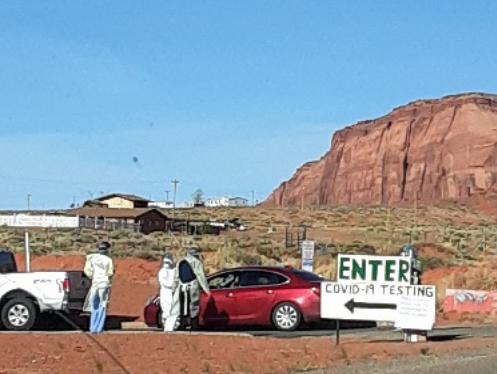
- Details
- By Levi Rickert
WINDOW ROCK, Ariz. — For the second day in a row were six more deaths reported that were related to the COVID-19 on the Navajo Nations, which means 12 have died in a two-day period. The Navajo Department of Health in coordination with the Navajo Epidemiology Center and the Navajo Area Indian Health Service announced the six additional deaths on Wednesday evening, which brings the death toll to 85 on the Navajo Nation.
Of those who died, 51 -60 percent- were males; 34 -40 percent- were females. The average age of death was 65 years old.
Also, there were 95 new cases of COVID-19 on the country's largest reservation. The total number of positive COVID-19 cases for the Navajo Nation has reached 2,654. A total of 16,280 COVID-19 tests have been administered with 12,170 negative test results.
The 2,654 confirmed positive cases on the Navajo Nation include the following counties:
· McKinley County, NM: 736 · Apache County, AZ: 656 · Navajo County, AZ: 574 · Coconino County, AZ: 306 · San Juan County, NM: 262 · San Juan County, UT: 46 · Socorro County, NM: 25 · Cibola County, NM: 25 · Bernalillo County: 3 · Sandoval County, NM: 21
On Wednesday, the Navajo Nation received approximately $600 million in CARES Act funding, which includes very specific guidelines and provisions from the U.S. Department of the Treasury.
“The funding we received represents only a portion of the CARES Act allocation, approximately 60-percent according to the federal government. We are in the process of carefully reviewing the guidelines and provisions from the Department of the Treasury. The Executive Branch advocated strongly through lobbying efforts at the congressional level and through the media and we took the federal government to court to get these funds and now we have to be able to account for all of it. This can’t be a free-for-all spending spree. $600 million may sound like a lot, but we have to remember that the infrastructure needs of the Navajo Nation alone amount to billions of dollars. When the Nation received settlement funds years ago, the Navajo Nation held public hearings and identified infrastructure, housing, and scholarship funding as top priorities, so we know what the needs are already,” Navajo Nation President Jonathan Nez said.
For more information including reports, helpful prevention tips, and more resources, please visit the Navajo Department of Health’s COVID-19 website at http://www.ndoh.navajo-nsn.gov/COVID-19. To contact the main Navajo Health Command Operations Center, please call (928) 871-7014.
More Stories Like This
Native News Weekly (August 25, 2024): D.C. BriefsNavajo Nation Mourns the Passing of Former Vice President Rex Lee Jim
Deb Haaland Earns Endorsement From Communications Workers of America Local 7076
University Soccer Standout Leads by Example
Two Native Americans Named to Democratic Congressional Campaign Committee's“Red to Blue” Program
Help us defend tribal sovereignty.
At Native News Online, our mission is rooted in telling the stories that strengthen sovereignty and uplift Indigenous voices — not just at year’s end, but every single day.
Because of your generosity last year, we were able to keep our reporters on the ground in tribal communities, at national gatherings and in the halls of Congress — covering the issues that matter most to Indian Country: sovereignty, culture, education, health and economic opportunity.
That support sustained us through a tough year in 2025. Now, as we look to the year ahead, we need your help right now to ensure warrior journalism remains strong — reporting that defends tribal sovereignty, amplifies Native truth, and holds power accountable.
 The stakes couldn't be higher. Your support keeps Native voices heard, Native stories told and Native sovereignty defended.
The stakes couldn't be higher. Your support keeps Native voices heard, Native stories told and Native sovereignty defended.
Stand with Warrior Journalism today.
Levi Rickert (Potawatomi), Editor & Publisher

